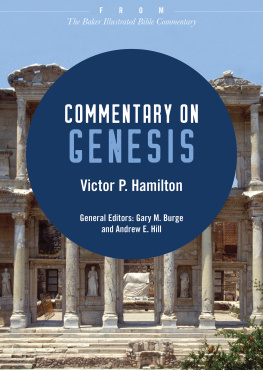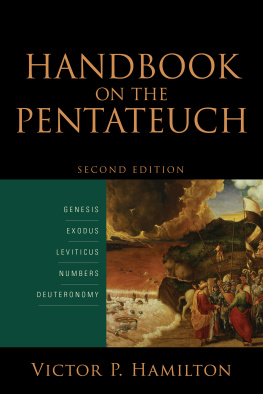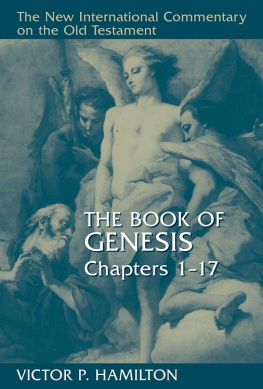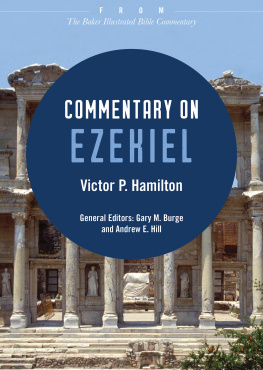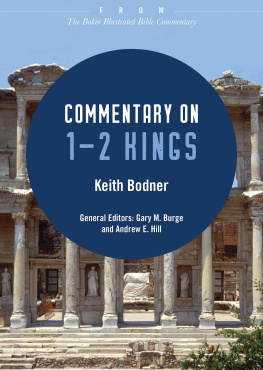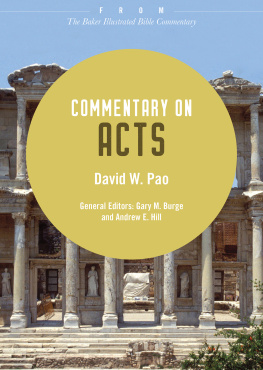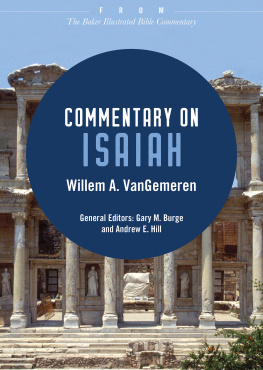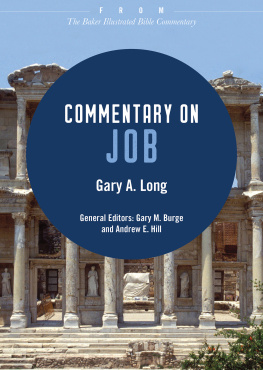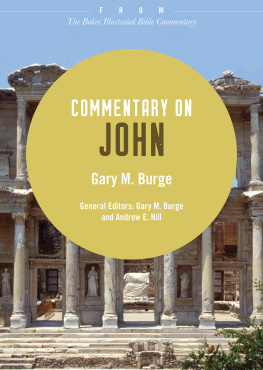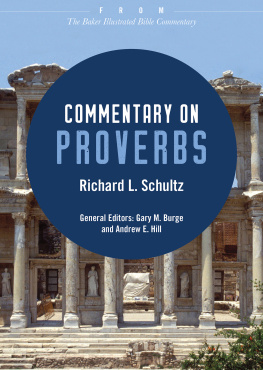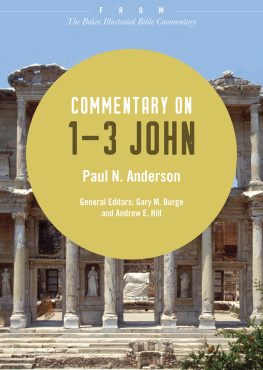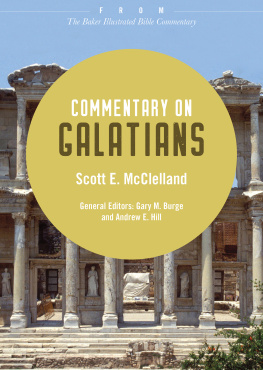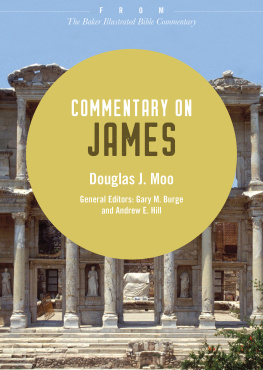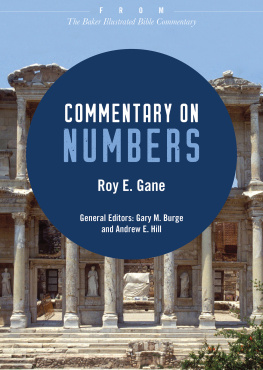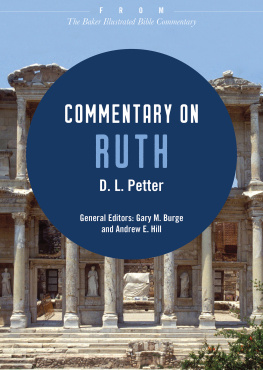Victor P. Hamilton - Commentary on Genesis: From The Baker Illustrated Bible Commentary
Here you can read online Victor P. Hamilton - Commentary on Genesis: From The Baker Illustrated Bible Commentary full text of the book (entire story) in english for free. Download pdf and epub, get meaning, cover and reviews about this ebook. year: 2019, publisher: Baker Publishing Group, genre: Religion. Description of the work, (preface) as well as reviews are available. Best literature library LitArk.com created for fans of good reading and offers a wide selection of genres:
Romance novel
Science fiction
Adventure
Detective
Science
History
Home and family
Prose
Art
Politics
Computer
Non-fiction
Religion
Business
Children
Humor
Choose a favorite category and find really read worthwhile books. Enjoy immersion in the world of imagination, feel the emotions of the characters or learn something new for yourself, make an fascinating discovery.
- Book:Commentary on Genesis: From The Baker Illustrated Bible Commentary
- Author:
- Publisher:Baker Publishing Group
- Genre:
- Year:2019
- Rating:3 / 5
- Favourites:Add to favourites
- Your mark:
- 60
- 1
- 2
- 3
- 4
- 5
Commentary on Genesis: From The Baker Illustrated Bible Commentary: summary, description and annotation
We offer to read an annotation, description, summary or preface (depends on what the author of the book "Commentary on Genesis: From The Baker Illustrated Bible Commentary" wrote himself). If you haven't found the necessary information about the book — write in the comments, we will try to find it.
Victor P. Hamilton: author's other books
Who wrote Commentary on Genesis: From The Baker Illustrated Bible Commentary? Find out the surname, the name of the author of the book and a list of all author's works by series.
Commentary on Genesis: From The Baker Illustrated Bible Commentary — read online for free the complete book (whole text) full work
Below is the text of the book, divided by pages. System saving the place of the last page read, allows you to conveniently read the book "Commentary on Genesis: From The Baker Illustrated Bible Commentary" online for free, without having to search again every time where you left off. Put a bookmark, and you can go to the page where you finished reading at any time.
Font size:
Interval:
Bookmark:
2012 by Baker Publishing Group
Published by Baker Books
a division of Baker Publishing Group
P.O. Box 6287, Grand Rapids, MI 49516-6287
www.bakerbooks.com
Ebook short created 2019
Previously published in The Baker Illustrated Bible Commentary edited by Gary M. Burge and Andrew E. Hill in 2012
All rights reserved. No part of this publication may be reproduced, stored in a retrieval system, or transmitted in any form or by any meansfor example, electronic, photocopy, recordingwithout the prior written permission of the publisher. The only exception is brief quotations in printed reviews.
Library of Congress Cataloging-in-Publication Data is on file at the Library of Congress, Washington, DC.
ISBN 978-1-4934-2439-9
Unless otherwise indicated, Scripture quotations are from the Holy Bible, New International Version. NIV. Copyright 1973, 1978, 1984, 2011 by Biblica, Inc. Used by permission of Zondervan. All rights reserved worldwide. www.zondervan.com. The NIV and New International Version are trademarks registered in the United States Patent and Trademark Office by Biblica, Inc.
Scripture quotations labeled ESV from The Holy Bible, English Standard Version (ESV), copyright 2001 by Crossway, a publishing ministry of Good News Publishers. Used by permission. All rights reserved. ESV Text Edition: 2007
Scripture quotations labeled NASB are from the New American Standard Bible, copyright 1960, 1962, 1963, 1968, 1971, 1972, 1973, 1975, 1977, 1995 by The Lockman Foundation. Used by permission. www.lockman.org
Scripture quotations labeled NIV 1984 are from the HOLY BIBLE, NEW INTERNATIONAL VERSION. NIV. Copyright 1973, 1978, 1984 by International Bible Society. Used by permission of Zondervan. All rights reserved.
Scripture quotations labeled NJPS are from the New Jewish Publication Society Version 1985 by The Jewish Publication Society. All rights reserved.
Scripture quotations labeled NKJV are from the New King James Version. Copyright 1982 by Thomas Nelson, Inc. Used by permission. All rights reserved.
Scripture quotations labeled NLT are from the Holy Bible , New Living Translation, copyright 1996, 2004, 2007 by Tyndale House. Used by permission of Tyndale House Publishers, Inc., Carol Stream, Illinois 60188. All rights reserved.
Scripture quotations labeled NRSV are from the New Revised Standard Version of the Bible, copyright 1989, by the Division of Christian Education of the National Council of the Churches of Christ in the United States of America. Used by permission. All rights reserved.
Scripture quotations labeled RSV are from the Revised Standard Version of the Bible, copyright 1952 [2nd edition, 1971] by the Division of Christian Education of the National Council of the Churches of Christ in the United States of America. Used by permission. All rights reserved.
Unless otherwise indicated, photos, illustrations, and maps are copyright Baker Photo Archive.
| ANET | Ancient Near Eastern Texts Relating to the Old Testament . Edited by J. B. Pritchard. 3rd ed. Princeton, 1969 |
| BDAG | Bauer, W., F. W. Danker, W. F. Arndt, and F. W. Gingrich. Greek-English Lexicon of the New Testament and Other Early Christian Literature. 3rd ed. Chicago, 1999 |
| ca. | circa (about, approximately) |
| cf. | compare |
| chap(s). | chapter(s) |
| COS | The Context of Scripture . Edited by W. W. Hallo. 3 vols. Leiden, 1997 |
| e.g. | for example |
| ESV | English Standard Version |
| HALOT | Koehler, L., W. Baumgartner, and J. J. Stamm. The Hebrew and Aramaic Lexicon of the Old Testament. Translated and edited under the supervision of M. E. J. Richardson. 5 vols. Leiden, 19942000 |
| HCSB | Holman Christian Standard Bible |
| i.e. | that is |
| KJV | King James Version |
| NASB | New American Standard Bible |
| NEB | New English Bible |
| NET | New English Translation |
| NIV | New International Version (2011 edition) |
| NIV 1984 | New International Version (1984 edition) |
| NJB | New Jerusalem Bible |
| NJPS | The Tanakh: The Holy Scriptures: The New JPS Translation according to the Traditional Hebrew Text |
| NKJV | New King James Version |
| NLT | New Living Translation |
| NRSV | New Revised Standard Version |
| RSV | Revised Standard Version |
| TDOT | Theological Dictionary of the Old Testament . Edited by G. J. Botterweck and H. Ringgren. Translated by J. T. Willis, G. W. Bromiley, and D. E. Green. 8 vols. Grand Rapids, 1974 |
| TNIV | Todays New International Version |
Victor P. Hamilton
Introduction
Authorship
Mosess name does not appear in the book of Genesis as it does in the other four books of the Pentateuch, nor is another author identified. For that reason, strictly speaking, Genesis is an anonymous book. There is no real problem with acknowledging this, for the majority of the books in the Old Testament are anonymous. Who wrote Kings? Who wrote Judges? We do not know. The presence of so many anonymous books in the Old Testament invites the reader to focus exclusively on what is said rather than on who said it. Content trumps source.
Jewish and Christian tradition alike have attributed Genesis to Moses. This position is based more on inference, or the lack of a more appealing alternative, than on clear textual data in Genesis. When the New Testament uses phrases such as Moses and all the Prophets (Luke 24:27) or Moses and the Prophets (Luke 16:29), we know that Jesus is speaking of the first two sections of the three-sectioned Hebrew Bible (Law, Prophets, Writings). As Prophets stands for Joshua, Judges, Samuel, Kings, Isaiah, Jeremiah, Ezekiel, and the twelve Minor Prophets, Moses stands for the Torah, Genesis through Deuteronomy. Jesus thus marks Genesis as Mosaic.
Most critical biblical scholars outside evangelical circles find the above conclusion both unconvincing and unacceptable. In its place they offer the Documentary Hypothesis, or the JEDP theory, which rejects both the Mosaic authorship of Genesis (and the rest of the Pentateuch) and its literary unity. It is alleged that multiple authors are indicated by (1) the presence of doublets (two creation accounts, two flood stories, two banishments of Hagar and Ishmael) that contain contradictory and mutually exclusive information, (2) several distinctly different writing styles and theological perceptions, and (3) the use of multiple names for deity (Elohim, Yahweh, Yahweh-Elohim), often in a single story.
Specifically, four documents are posited. The first is J (for in it the name for deity is Yahweh/Jehovah), which was written in the time of David and Solomon in Jerusalem. The second is E (Elohim is the name for deity here), written about a century later somewhere in northern Israel. After these two documents were spliced, D (for Deuteronomy, or parts of Deuteronomy) was produced in the late eighth or seventh century BC. Finally, around the time of the exile or shortly thereafter (550450 BC), the P (for priestly) materials were added. Subsequently someone edited all of the documents to give us our Pentateuch. There are currently multiple reconfigurations of the JEDP sequence; for example, one would place J last, and another reverses D and P (i.e., from Deuteronomy: Priestly to Priestly: Deuteronomy).
Font size:
Interval:
Bookmark:
Similar books «Commentary on Genesis: From The Baker Illustrated Bible Commentary»
Look at similar books to Commentary on Genesis: From The Baker Illustrated Bible Commentary. We have selected literature similar in name and meaning in the hope of providing readers with more options to find new, interesting, not yet read works.
Discussion, reviews of the book Commentary on Genesis: From The Baker Illustrated Bible Commentary and just readers' own opinions. Leave your comments, write what you think about the work, its meaning or the main characters. Specify what exactly you liked and what you didn't like, and why you think so.

